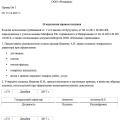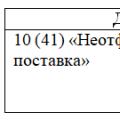List of documents for privatization of an apartment. A detailed list of documents for registration of privatization of an apartment, as well as the procedure for obtaining them. The procedure for privatizing an apartment under a social tenancy agreement
To privatize an apartment owned by the municipality, it is necessary to prepare the following documents:
- Application for privatization of housing. Samples can be downloaded from many websites.
- Passports of all citizens taking part in privatization. For minors - birth certificates. If available, marriage certificates.
- Social tenancy agreement or move-in order. If you need to restore them, you should contact the EIRC.
- Technical passport from BTI. It indicates the technical and floor plans. An important point is that a technical passport will not be issued if an uncoordinated redevelopment is discovered. It must first be legalized.
- Cadastral passport indicating the area of the apartment, layout, etc. It is issued at the MFC or at the cadastral chamber. According to the law, the issuance of a cadastral passport must be carried out no later than 5 days from the date of citizens’ application.
- Federal Law certificate of registration at the place of residence.
- Extract from the house register. It must list all residents currently living and registered in the apartment. The extract is issued at the passport office. To do this, you need to present a social tenancy agreement (movement order) and a passport. The statement is valid only for 14 days.
- Certificate of non-participation in privatization. Issued by the BTI. This document must be obtained separately for each privatization participant. According to the legislation of the Russian Federation, each citizen (excluding minors) can exercise the right to privatize housing only once.
- Extract from personal account. Issued at the passport office. Confirms the absence of debts on utility bills. If you have debts, you must pay them off, otherwise the statement will not be issued.
- Extract from the Unified State Register (form No. 3) for each person taking part in privatization. This document indicates whether the citizen owns other real estate.
- Extract from the Unified State Register for the apartment. Issued at the MFC or passport office on the basis of a passport and full residential address. You must pay a state fee of 400 rubles.
Additional documents
Listed above are the main documents that are required in all constituent entities of the Russian Federation. Depending on the specifics of local legislation and in a number of other cases, the following documents may also be required:
- A notarized power of attorney from every adult citizen participating in privatization. Required if only one person is submitting documents.
- A notarized refusal to privatize any of the residents. If this person has previously participated in the privatization of housing, then such a refusal does not need to be formalized.
- Death certificates of all family members who previously lived in the municipal apartment.
- Help to clarify your place of residence. Issued at the passport office. It is necessary if the addresses in passports and the social tenancy agreement (order) differ. Any errors require the issuance of such a certificate.
- Certificate of citizenship. This document is ordered at OVIR and received at the passport office at your place of residence. The certificate is required for persons who were previously citizens of other countries and then acquired Russian citizenship.
- Extract from the Unified State Register, extended extract from the house register, certificate of participation in privatization in form No. 2. These three documents are necessary for citizens who have previously taken part in the privatization of housing.
- Extract from house books for previous and current place of residence. Required for citizens who registered in a privatized apartment after July 1, 1991.
Additional documents for children
If the social rental agreement contains information about minor residents, but they are discharged from the apartment, they are still given the right to participate in privatization. In this case, you need to prepare the following documents:
- Permission from guardianship authorities. The law allows 2 weeks for the preparation of this document. Permission must be obtained from both parents.
- An extract from the house books at the previous and current place of residence for the guardianship authorities.
Documents for children under guardianship:
- Order on the appointment of a guardian by the guardianship authorities.
- Permission from the guardianship authorities for the housing privatization procedure.
Since the collapse of the Soviet Union, the privatization of living space continues to be a pressing issue for many people living in the vastness of the Russian Federation.
The fact is that during the Soviet era, housing was under the control of the state and could not be private property. In 1991, a law was passed that began the process of free privatization of apartments and country houses among the population. This was supposed to finally help the country transition to a market economy and get rid of housing guardianship. Before the adoption of this law, people entered into a municipal agreement with the state to rent an apartment.
According to the latest rumors, the free process of transferring or selling state property has extended throughout 2019. Let us remember that it was already going to be canceled or suspended several times.
What are the conditions for privatization
Not all types of living space are suitable for this process. The question “What types of residential premises are not suitable for privatization” will be answered by the list below.
So, the following are not suitable for privatization:
- military camps and housing in them;
- housing in disrepair or without long-term repairs;
- housing that does not have a BTI plan or is not registered for redevelopment;
- apartments that are owned by public utilities.
These types of housing are not subject to the law on the free form of property conversion due to the features that these residential areas have in their location, purpose and other criteria. Any attempts to privatize them will be unsuccessful, and if you try to do this through a bribe to the relevant authorities, you may face a serious fine.
All other types of housing can be absolutely calmly registered and owned undividedly.
The law on free privatization allows a citizen of the Russian Federation to choose an apartment and become its owner, carrying out the procedure once in a lifetime. Development, as mentioned above, was launched in 1991 and continues to this day.
List of groups of people who can privatize housing
As usually happens in such cases, almost every Russian citizen over 18 years of age can privatize an apartment if they have the appropriate documents. It is also worth noting that you can register an apartment in any corner of the country, and not just at your place of residence. You only need the relevant documents from your original place of residence. There are no restrictions on the duration of possession of a passport of the Russian Federation (if, for example, you moved to Russia not so long ago and have already received citizenship), since its very presence is important.
Thus, absolutely all Russian citizens over 18 years of age who have the appropriate papers and an unexpired passport can own an apartment. I would like to note that, first of all, military personnel who are on the military register of the Armed Forces of the Russian Federation will be allowed to privatize housing.
List of documents required for privatization in 2018-2019
The transfer of state property into private hands takes place in several stages. Each of them is described in detail below. Follow it - and you will not notice the real complexity of the process.
First stage:
You are collecting basic documents for your apartment. This:
- Social tenancy agreement or warrant for an apartment (can be obtained from the unified information and settlement center).
- Technical passport (you can and should order it from the BTI).
- Cadastral passport.
- A detailed extract from your house register with information about all the people living with you.
- A document from the Unified State Register of the property.
- A certificate indicating non-participation in privatization earlier.
- Personal account for your apartment. It is recommended to have no debts or debts.
- If you have entrusted the process to a professional, issue a notarized power of attorney for him to collect the necessary documents;
- Personal data and acts of all privatization participants.
The second stage consists of collecting a list of additional papers that are necessary to obtain privatization in a shorter time frame.
If children participate in privatization, then it is necessary to collect:
- permission from the guardianship authorities for privatization;
- certificates from your house register from your previous and new place of residence;
If the process involves people who registered in the apartment after 1991, you will need to have with you an extract from the house register of their previous place of residence.
If a child is under guardianship in the apartment, you need to have an order to appoint a guardian and permission to privatize the guardianship authorities.
If among you there are citizens of other countries, a certificate from the Visa and Registration Department is required. This certificate must confirm the citizenship of the individual (Russian citizenship).
If one of the privatization participants was previously noticed in privatization, then he must provide a certificate of non-participation in this procedure, a detailed extract from the house register, a complete extract from the Unified State Register using form No. 3.
For personal documents, you will need a passport, death/birth and marriage certificates.
What should I give where?
Now let’s look at the question of who and where to give the certificates.
To the BTI you bring your passport, social rent agreement, and an extract from the house register.
Bring to the property management department a social tenancy agreement, technical and cadastral passports, a passport of a citizen of the Russian Federation, and an extract from the house register.
Registration of a privatization agreement
To do this, you need to provide cadastral and technical passports, a personal account of the apartment, a warrant for the apartment, passports of all participants, extracts from the house register, certificates of non-participation in privatization earlier, an extract from Rosreestr and a certificate from the Unified State Register.
We issue a certificate of ownership
Here you will need cadastral and technical passports, an extract from Rosreestr, refusals of privatization, passports of all participants, a warrant for an apartment, a privatization agreement for each of the privatization participants.
After you go through all the procedures, you will be given a document that will be evidence of your right to own and dispose of your living space.
There is a special offer for visitors to our website - you can get advice from a professional lawyer completely free of charge by simply leaving your question in the form below.
Absolutely all citizens have been talking about the end of the privatization program for many years. Some were in a hurry to carry out the operation, others weighed all the pros and cons, and in the meantime the President signed a Decree extending the program for an unlimited time. This is good news for forgetful renters. They can privatize an apartment in 2018 by collecting a full set of necessary documents and contacting government agencies.
Which housing will be privatized and which will not?
In accordance with current legislation, citizens have the right to privatize municipal housing in which they live on the basis of an occupancy order or a social tenancy agreement.
At the same time, there is a list of objects that cannot be registered as property. This:
- Apartments in disrepair in buildings that are subject to demolition;
- Housing obtained for the performance of work and owned by the employer;
- In closed cities for the military;
- In environmental areas.

Video 1. Free privatization of housing extended until March 1, 2018
The privatization procedure should begin by clarifying these points; if housing is not included in this list, you can safely collect documents - they should not refuse you. If government officials do not agree to privatize the apartment, and there are no objective reasons for this, they should go to court to resolve controversial issues. This situation rarely occurs in practice.
List of documents for privatization
The list of documents is very impressive, it will take more than one day to prepare, but you should be patient - at the end of the procedure you will become the full owner of the property. So, what papers will be required?
- Social tenancy agreement (formerly a move-in order). This document is concluded between the citizen and the city administration. If the paper is lost, you can restore it there by providing receipts for payment of utilities, extracts from your home book;
- A technical passport for an apartment is issued at the BTI, where the owner must apply with a rental agreement. If redevelopment was carried out, the procedure must be legalized - this is done by a visiting team that takes measurements in the house;
- A cadastral passport is another document issued by the BTI. It will indicate the area of the apartment and other important details;
- Extract from home book (from personal account) - it contains information about all registered citizens, can be obtained at the Passport Office;
- Certificate from the Unified State Register – serves as proof that the real estate is owned by the municipality;
- A certificate from the BTI stating that the applicant has not previously participated in privatization. By law, this can only be done once in a lifetime;
- Refusal to participate in privatization, certified by a notary - in case registered family members do not want to participate in the procedure. By the way, they will still be able to live in the apartment regardless of their participation in the program.

Video 2. Officials benefit from free privatization of housing in 2018
This is a general list of papers that are needed to privatize an apartment in all cases. Additionally, you need to provide personal documents: passports, birth and marriage certificates, as well as death certificates of persons previously registered in the apartment.
Step-by-step execution of all documents
In order to privatize housing as quickly as possible and avoid mistakes, it is recommended to collect papers and permits from government agencies in the following sequence:
- A statement of desire to participate in the privatization program is drawn up;
- A lease agreement is drawn up in the absence of one;
- The cadastral and technical passport is prepared at the BTI - the longest stage, since an on-site inspection by specialists is required;
- An extract from the personal account is made;
- An agreement on the transfer of ownership of housing is concluded;
- An application is written to obtain a certificate from Rosreestr.
The papers will be ready in 5 working days - specialists will enter the changed data into a single database and issue a certificate of ownership.
Of course, the instructions are advisory in nature. This should include obtaining other documents for special cases - for example, permission from the guardianship authorities if the child refuses to participate in the program. We must not forget that most documents have a validity period - from 10 days to a month; if the time expires, privatization will not be carried out - you must pay the state fee again and obtain certificates.
Video 3. PRIVATIZATION IN RUSSIA 2018 who benefits from this?
You can clarify the list of documents required to participate in the program at the MFC or the District Administration. It takes about 8 weeks to collect all the papers and complete the procedure, provided there are no queues. In 2018, the list of required documents did not change, but the time frame for conducting transactions with government agencies was slightly reduced.
 Arachidonic Acid: When Inflammation Benefits Arachidonic Acid in the Human Body
Arachidonic Acid: When Inflammation Benefits Arachidonic Acid in the Human Body Order on the right to sign primary documents
Order on the right to sign primary documents Accounting accounts 60.01. Expanded balance. Accounting for advances issued
Accounting accounts 60.01. Expanded balance. Accounting for advances issued